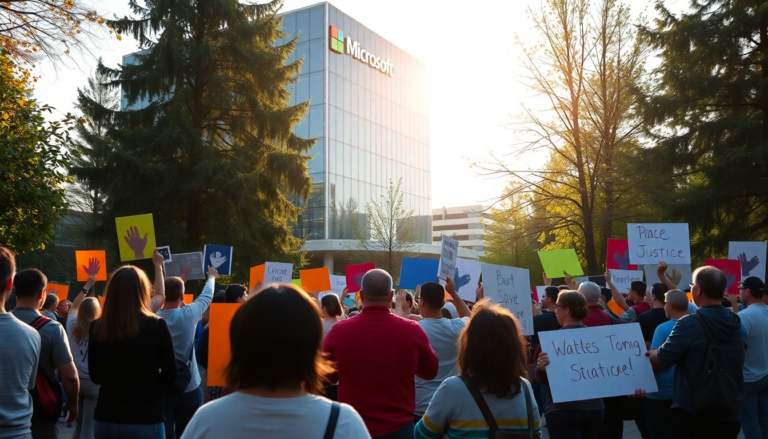Argomenti trattati
On Tuesday, 18 members of the protest group “No Azure for Apartheid” were arrested at Microsoft’s East Campus Plaza in Redmond, Washington. These activists were making their voices heard against Microsoft’s perceived complicity in military actions involving Israel. Specifically, they allege that Microsoft’s Azure cloud platform is being used for military operations against Palestinians. What prompted this resurgence of protests? Just a day earlier, police had cleared the area, but the activists returned, determined to continue their fight.
The Arrests and Charges
The protestors faced a range of charges, including trespassing, malicious mischief, and resisting arrest. According to Redmond police, some demonstrators poured red paint over the Microsoft sign to symbolize bloodshed, while others obstructed a nearby pedestrian bridge using tables and chairs taken from local vendors. The authorities stated that the protest caused disruptions at a local farmer’s market, with reports suggesting that vandalism occurred during the event.
In response to the incident, a Microsoft spokesperson highlighted the negative impact on local businesses, stating, “Protestors engaged in vandalism and property damage.” This raises the question: how do protests like these balance the need for activism with the potential harm to local communities?
Context of the Protests
The protests stem from serious allegations that Microsoft’s services are being used to support Israeli military actions in Gaza, which have resulted in substantial civilian casualties. According to the Palestinian Ministry of Health, over 62,000 people, including many children, have died since October 2023. The United Nations has reported that aid seekers in Gaza have also faced deadly assaults, intensifying the sense of urgency surrounding these protests.
In light of these claims, Microsoft has reiterated its commitment to human rights and is currently conducting an independent review of the situation. The company’s spokesperson stated, “We are doing the hard work needed to uphold our human rights standards in the Middle East.” This review comes in response to investigations suggesting that Israel may be utilizing Microsoft’s Azure platform for surveillance and military operations. How will this independent review shape the future of Microsoft’s operations in the region?
Protesters’ Statements and Future Actions
The protest group has taken a bold stance, declaring Microsoft’s East Campus Plaza a “Liberated Zone” and renaming it the “Martyred Palestinian Children’s Plaza.” They have expressed solidarity with those who were arrested, emphasizing that the police’s actions are minor compared to the violence that Palestinians endure daily. Isn’t it fascinating how symbols can transform a space and give it new meaning?
Moreover, the protestors have made it clear that their movement is far from over. “Our message to Microsoft CEO Satya Nadella is this: our movement will not stop,” they asserted, vowing to persist in their actions against the company’s alleged role in the Israeli military’s operations. Their demands can be found on their website, outlining their commitment to confront Microsoft’s operations consistently. What implications might this ongoing activism have for the tech giant?
As this situation continues to develop, Microsoft maintains its stance on accountability, asserting that it is working to address any unlawful actions that disrupt business or endanger lives. Thankfully, local authorities have confirmed that no injuries were reported during the protests or arrests. But as we look ahead, one thing is clear: the dialogue surrounding technology and ethics is only just beginning.

